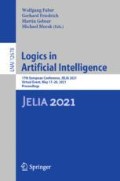Abstract
Search-optimization problems are plentiful in scientific and engineering domains. MaxSAT and answer set programming with weak constraints (ASP-WC) are popular frameworks for modeling and solving search problems with optimization criteria. There is a solid understanding on how SAT relates to ASP. Yet, the question on how MaxSAT relates to ASP-WC is not trivial. The answer to this question provides us with the means for cross fertilization between distinct subareas of automated reasoning. In this paper, we propose a weighted abstract modular framework that allows us to (i) capture MaxSAT and ASP-WC and (ii) state the exact link between these distinct paradigms. These findings translate, for instance, into the immediate possibility of utilizing MaxSAT solvers for finding solutions to ASP-WC programs.
The work was partially supported by NSF grant 1707371.
Access this chapter
Tax calculation will be finalised at checkout
Purchases are for personal use only
References
Alviano, M.: Algorithms for solving optimization problems in answer set programming. Intelligenza Artificiale 12, 1–14 (2018). https://doi.org/10.3233/IA-180119
Andres, B., Kaufmann, B., Matheis, O., Schaub, T.: Unsatisfiability-based optimization in clasp. In: Dovier, A., Costa, V.S. (eds.) Technical Communications of the 28th International Conference on Logic Programming (ICLP 2012). Leibniz International Proceedings in Informatics (LIPIcs), Dagstuhl, Germany, vol. 17, pp. 211–221. Schloss Dagstuhl-Leibniz-Zentrum fuer Informatik (2012). https://doi.org/10.4230/LIPIcs.ICLP.2012.211, http://drops.dagstuhl.de/opus/volltexte/2012/3623
Argelich, J., Li, C.M., Manyà, F., Planes, J.: The first and second max-sat evaluations. J. Satisf. Boolean Model. Comput. 4, 251–278 (2008)
Argelich, J., Lynce, I., Marques-Silva, J.: On solving boolean multilevel optimization problems. In: Proceedings of the 21st International Joint Conference on Artificial Intelligence, pp. 393–398. IJCAI 2009, Morgan Kaufmann Publishers Inc., San Francisco, CA, USA (2009)
Brewka, G., Delgrande, J.P., Romero, J., Schaub, T.: asprin: Customizing answer set preferences without a headache. In: Proceedings of the Twenty-Ninth AAAI Conference on Artificial Intelligence, Austin, Texas, USA. pp. 1467–1474 (2015). http://www.aaai.org/ocs/index.php/AAAI/AAAI15/paper/view/9535
Brewka, G., Eiter, T.: Equilibria in heterogeneous nonmonotonic multi-context systems. In: Proceedings of National Conference on Artificial Intelligence, vol. 2007, pp. 385–390. AAAI (2007)
Calimeri, F., et al.: ASP-Core-2 input language format (2013). https://www.mat.unical.it/aspcomp2013/files/ASP-CORE-2.03c.
Clark, K.: Negation as failure. In: Gallaire, H., Minker, J. (eds.) Logic and Data Bases, pp. 293–322. Plenum Press, New York (1978)
Di Rosa, E., Giunchiglia, E.: Combining approaches for solving satisfiability problems with qualitative preferences. AI Commun. 26(4), 395–408 (2013). http://dl.acm.org/citation.cfm?id=2594602.2594606
Ferraris, P.: Answer sets for propositional theories. In: Proceedings of International Conference on Logic Programming and Nonmonotonic Reasoning (LPNMR), pp. 119–131 (2005)
Fu, Z., Malik, S.: On solving the partial MAX-SAT problem. In: Biere, A., Gomes, C.P. (eds.) SAT 2006. LNCS, vol. 4121, pp. 252–265. Springer, Heidelberg (2006). https://doi.org/10.1007/11814948_25
Giunchiglia, E., Lierler, Y., Maratea, M.: Answer set programming based on propositional satisfiability. J. Autom. Reas. 36, 345–377 (2006)
Janhunen, T.: Some (in)translatability results for normal logic programs and propositional theories. J. Appl. Non-Classical Logics, 35–86 (2006)
Lierler, Y.: Relating constraint answer set programming languages and algorithms. Artif. Intell. 207C, 1–22 (2014)
Lierler, Y.: What is answer set programming to propositional satisfiability. Constraints 22, 307–337 (2017)
Lierler, Y., Truszczyński, M.: An abstract view on modularity in knowledge representation. In: Proceedings of the AAAI Conference on Artificial Intelligence (2015)
Lierler, Y., Truszczyński, M.: Abstract modular inference systems and solvers. Artif. Intell. 236, 65–89 (2016)
Lifschitz, V., Tang, L.R., Turner, H.: Nested expressions in logic programs. Ann. Math. Artif. Intell. 25, 369–389 (1999)
Lin, F., Zhao, Y.: ASSAT: Computing answer sets of a logic program by SAT solvers. In: Proceedings of National Conference on Artificial Intelligence (AAAI), pp. 112–117. MIT Press (2002)
Mitchell, D.G.: A SAT solver primer. EATCS Bull. (Logic Comput. Sci. Column). 85, 112–133 (2005)
Nieuwenhuis, R., Oliveras, A.: On SAT modulo theories and optimization problems. In: Biere, A., Gomes, C.P. (eds.) SAT 2006. LNCS, vol. 4121, pp. 156–169. Springer, Heidelberg (2006). https://doi.org/10.1007/11814948_18
Robinson, N., Gretton, C., Pham, D.N., Sattar, A.: Cost-optimal planning using weighted maxsat. In: ICAPS 2010 Workshop on Constraint Satisfaction Techniques for Planning and Scheduling (COPLAS10) (2010)
Shen, D., Lierler, Y.: SMT-based constraint answer set solver EZSMT+ for non-tight programs. In: Proceedings of the 16th International Conference on Principles of Knowledge Representation and Reasoning (KR) (2018)
Tasharrofi, S., Ternovska, E.: A semantic account for modularity in multi-language modelling of search problems. In: Tinelli, C., Sofronie-Stokkermans, V. (eds.) FroCoS 2011. LNCS (LNAI), vol. 6989, pp. 259–274. Springer, Heidelberg (2011). https://doi.org/10.1007/978-3-642-24364-6_18
Author information
Authors and Affiliations
Corresponding author
Editor information
Editors and Affiliations
Rights and permissions
Copyright information
© 2021 Springer Nature Switzerland AG
About this paper
Cite this paper
Lierler, Y. (2021). An Abstract View on Optimizations in SAT and ASP. In: Faber, W., Friedrich, G., Gebser, M., Morak, M. (eds) Logics in Artificial Intelligence. JELIA 2021. Lecture Notes in Computer Science(), vol 12678. Springer, Cham. https://doi.org/10.1007/978-3-030-75775-5_25
Download citation
DOI: https://doi.org/10.1007/978-3-030-75775-5_25
Published:
Publisher Name: Springer, Cham
Print ISBN: 978-3-030-75774-8
Online ISBN: 978-3-030-75775-5
eBook Packages: Computer ScienceComputer Science (R0)

